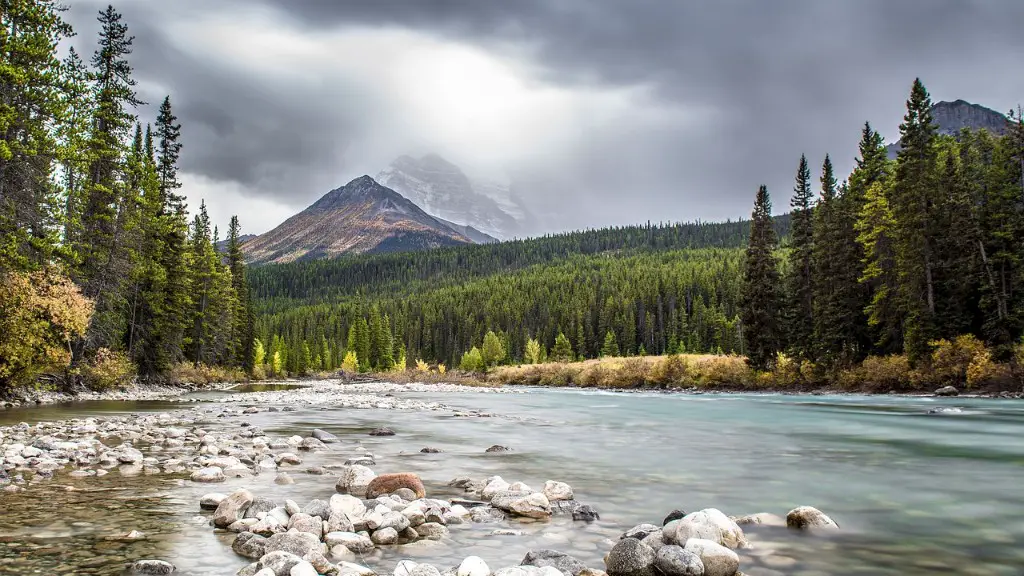The Mississippi River Delta region is one of the largest and most impactful delta systems in the world. It has a powerful influence over the environment, economy, and people of the region. Understanding the delta of the Mississippi River is essential for a complete understanding of the region’s ecology and values.
The Mississippi River Delta is an area of land at the mouth of the Mississippi River where the river spreads out across the Gulf of Mexico. The broad, flat wetlands of the delta protect the area from sea-level rise and storm surges from the Gulf of Mexico. The delta has numerous small rivers and channels that carry fresh and brackish water throughout the region. Over time, the currents of the Mississippi River have created a series of ridges and mounds called the Birdfoot Delta, named after the shape of the delta in a bird’s eye view.
The Mississippi River Delta is vast in size, encompassing over 24,000 square miles of land. The Delta covers regions of Louisiana and Mississippi, as well as parts of Arkansas, Texas, Alabama, and Florida. It stretches 270 miles along the Gulf of Mexico and varies in width from 30 to 140 miles. In total, the delta comprises more than six million acres of diverse habitats, including coastal wetlands, bottomland hardwood forests, swamps, lakes, and grassy marshes.
The Delta region has historically been home to numerous species of plants and animals; however, its ecological integrity is now threatened by activities such as dredging, land reclamation, flood control, and shipping. These activities have disrupted natural flows of the Mississippi River, reducing downstream sediment transport to the Delta and resulting in a significant loss of wetlands. This has led to a dramatic decrease in biodiversity, along with increased threats from storms and sea-level rise.
In order to restore and protect the Delta region, numerous projects have been implemented to restore and rebuild wetlands, reduce coastal erosion, restore water flows, and protect against sea-level rise. These projects demonstrate the commitment of both state and federal governments to the conservation of the Mississippi River Delta.
The Delta region’s environmental, economic, and social importance make its continued protection an urgent priority. Despite threats to its ecological integrity, the Delta is still home to a vast array of plants, animals, and people. It serves as a source of livelihood for many people and continues to provide important ecosystem services, such as storm protection and flood control, to the region.
Political Context
Louisiana, due to location and area, has come to face its own unique set of challenges in preserving and restoring the Delta. Historically, the USDA and state government have worked together to invest funding into restoring and preserving the Delta. In response to the dramatic reduction in wetlands, the government has created and implemented numerous programs and incentives to protect the Delta.
The most recent program is the Coastal Wetlands Planning, Protection and Restoration (CWPPRA) Act, which was implemented to protect the Delta region from threats such as oil and gas development and reduce coastal erosion. The program has invested millions of dollars into wetland restoration and conservation, providing funding for projects such as shoreline protection, river diversion, wetland restoration, and habitat conservation.
CWPPRA also works in collaboration with local, state and federal partners to develop plans for the conservation and restoration of the Delta. Through this cooperation, the program supports local communities in the Delta region, providing jobs, economic development, and strategies to combat erosion, oil and gas development, and other threats.
Role of Private Sector
The private sector has become an important part of the Delta restoration and conservation effort. Private businesses, ranging from oil and gas companies to small businesses, have invested in projects and initiatives to protect the Delta’s ecosystems.
Oil and gas companies in the region have invested in efforts to reduce the impact of their activities on the Delta, while preserving the environment. In addition, corporations such as the Walton Family Foundation and the Rockefeller Foundation have invested in the Delta region, providing financial and technical support for conservation, restoration, and environmental education initiatives.
In addition to large corporations, smaller businesses have also played an important role in Delta restoration and conservation. Local businesses have invested in projects to improve water quality, restore wetlands and create local jobs, as well as other initiatives such as volunteer programs and habitat restoration initiatives.
Communication and Education
Raising awareness and educating the public about the importance of the Delta region is key to its protection and long-term sustainability. Through education, utility managers, elected officials, and community members can understand the role of the Delta in their lives and the importance of preserving it for future generations.
The Mississippi Delta region also serves as an outdoor classroom, providing opportunities for experiential learning. Schools and universities throughout the region and beyond provide field experiences, allowing students to gain first-hand knowledge of the ecology, economy, and culture of the Delta.
Communication campaigns and advocacy organizations such as Restore the Mississippi River Delta have helped to raise awareness of the Delta region and call attention to the need for its protection. The organization has launched campaigns to educate the public and policymakers and to promote policies that protect the Delta region.
Impact of Climate Change
Climate change is expected to have a dramatic impact on the Delta region, leading to increased coastal erosion, flooding, and sea-level rise. These impacts will likely have a devastating impact on the Delta, exacerbating existing threats from oil and gas development and other activities.
As a result of climate change, the Delta region is likely to experience increased flooding, increased temperatures, and higher sea levels. This will result in a decrease in freshwater flows and decreased sediment transport, leading to the loss of wetlands. It could also lead to an increase in coastal storms, which could cause severe damage to the region.
It is essential to mitigate the impacts of climate change on the Delta region. In order to do so, policies, regulations, and programs aimed at reducing climate change impacts must be put in place. In addition, collaboration between government, businesses, research institutions, and environmental groups is essential in order to ensure a protected future for the Delta region.
International Agreements
International agreements and protocols have played an important role in reducing the impacts of climate change on the Delta region. The Paris Agreement and the United Nations Framework Convention on Climate Change are two important initiatives that have helped to reduce the impacts of climate change on the Delta region.
The Paris Agreement is an international agreement that seeks to limit the global average temperature increase to 1.5°C. This agreement, as well as the United Nations Framework Convention on Climate Change, has provided countries with the framework to work together to reduce emissions, protect ecosystems, and promote sustainable development in vulnerable areas, such as the Delta region.
In addition to these international agreements, local initiatives and partnerships are essential in order to ensure a protected and healthy Delta region. The collaboration of governments, private companies, nonprofits, and citizens is essential in order to develop effective strategies to protect and restore the Delta region.
Conclusion
The Mississippi River Delta constitutes a vast and important ecosystem, and its protection is an urgent priority. In order to ensure a healthy and secure future for the Delta region, it is essential for public and private actors to come together and actively take part in initiatives aimed at conservation and restoration. International agreements, as well as local partnerships and initiatives, must be put in place in order to reduce the impacts of climate change on the Delta region. It is only through collaboration and dedication that the Delta region can be protected and its important ecological and socio-economic values can be maintained.





